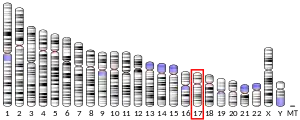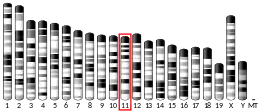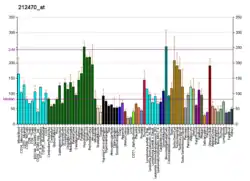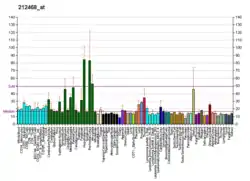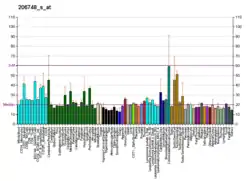Sperm-associated antigen 9
C-jun-amino-terminal kinase-interacting protein 4 is a scaffold protein that in humans is encoded by the SPAG9 gene.[5][6][7]
Function
Extracellular signals are transduced into cells through mitogen-activated protein kinases. The structural organization of these kinases into specific signaling domains is facilitated by scaffolding proteins involved in closely tethering different kinases so that successive phosphorylation events can occur. The protein encoded by this gene is a scaffolding protein that brings together mitogen-activated protein kinases and their transcription factor targets for the activation of specific signaling pathways. This gene which is abundantly expressed in testicular haploid germ cells encodes a protein that is recognized by sperm-agglutinating antibodies and implicated in infertility.[7]
Clinical significance
SPAG9 is a potential biomarker for early cervical carcinoma[8] bladder cancer,[9] and lung cancer.[10]
References
- GRCh38: Ensembl release 89: ENSG00000008294 - Ensembl, May 2017
- GRCm38: Ensembl release 89: ENSMUSG00000020859 - Ensembl, May 2017
- "Human PubMed Reference:". National Center for Biotechnology Information, U.S. National Library of Medicine.
- "Mouse PubMed Reference:". National Center for Biotechnology Information, U.S. National Library of Medicine.
- Shankar S, Mohapatra B, Suri A (Feb 1998). "Cloning of a novel human testis mRNA specifically expressed in testicular haploid germ cells, having unique palindromic sequences and encoding a leucine zipper dimerization motif". Biochemical and Biophysical Research Communications. 243 (2): 561–5. doi:10.1006/bbrc.1997.7943. PMID 9480848.
- Bowman AB, Kamal A, Ritchings BW, Philp AV, McGrail M, Gindhart JG, Goldstein LS (Nov 2000). "Kinesin-dependent axonal transport is mediated by the sunday driver (SYD) protein". Cell. 103 (4): 583–94. doi:10.1016/S0092-8674(00)00162-8. PMID 11106729. S2CID 247102.
- "Entrez Gene: SPAG9 sperm associated antigen 9".
- Garg M, Kanojia D, Salhan S, Suri S, Gupta A, Lohiya NK, Suri A (2009). "Sperm-associated antigen 9 is a biomarker for early cervical carcinoma". Cancer. 115 (12): 2671–83. doi:10.1002/cncr.24293. PMID 19326449. S2CID 23461660.
- Kanojia D, Garg M, Saini S, Agarwal S, Parashar D, Jagadish N, Seth A, Bhatnagar A, Gupta A, Kumar R, Lohiya NK, Suri A (2013). "Sperm associated antigen 9 plays an important role in bladder transitional cell carcinoma". PLOS ONE. 8 (12): e81348. Bibcode:2013PLoSO...881348K. doi:10.1371/journal.pone.0081348. PMC 3857194. PMID 24349057.
- Ren B, Wei X, Zou G, He J, Xu G, Xu F, Huang Y, Zhu H, Li Y, Ma G, Yu P (2016). "Cancer testis antigen SPAG9 is a promising marker for the diagnosis and treatment of lung cancer". Oncology Reports. 35 (5): 2599–605. doi:10.3892/or.2016.4645. PMC 4811394. PMID 26934841.
- Lee CM, Onésime D, Reddy CD, Dhanasekaran N, Reddy EP (Oct 2002). "JLP: A scaffolding protein that tethers JNK/p38MAPK signaling modules and transcription factors". Proceedings of the National Academy of Sciences of the United States of America. 99 (22): 14189–94. Bibcode:2002PNAS...9914189L. doi:10.1073/pnas.232310199. PMC 137859. PMID 12391307.
Further reading
- Ichijo H (Nov 1999). "From receptors to stress-activated MAP kinases". Oncogene. 18 (45): 6087–93. doi:10.1038/sj.onc.1203129. PMID 10557099.
- Nakajima D, Okazaki N, Yamakawa H, Kikuno R, Ohara O, Nagase T (Jun 2002). "Construction of expression-ready cDNA clones for KIAA genes: manual curation of 330 KIAA cDNA clones". DNA Research. 9 (3): 99–106. doi:10.1093/dnares/9.3.99. PMID 12168954.
- Nagase T, Ishikawa K, Miyajima N, Tanaka A, Kotani H, Nomura N, Ohara O (Feb 1998). "Prediction of the coding sequences of unidentified human genes. IX. The complete sequences of 100 new cDNA clones from brain which can code for large proteins in vitro". DNA Research. 5 (1): 31–9. doi:10.1093/dnares/5.1.31. PMID 9628581.
- Lee CM, Onésime D, Reddy CD, Dhanasekaran N, Reddy EP (Oct 2002). "JLP: A scaffolding protein that tethers JNK/p38MAPK signaling modules and transcription factors". Proceedings of the National Academy of Sciences of the United States of America. 99 (22): 14189–94. Bibcode:2002PNAS...9914189L. doi:10.1073/pnas.232310199. PMC 137859. PMID 12391307.
- Yasuoka H, Ihn H, Medsger TA, Hirakata M, Kawakami Y, Ikeda Y, Kuwana M (Dec 2003). "A novel protein highly expressed in testis is overexpressed in systemic sclerosis fibroblasts and targeted by autoantibodies". Journal of Immunology. 171 (12): 6883–90. doi:10.4049/jimmunol.171.12.6883. PMID 14662895.
- Bouwmeester T, Bauch A, Ruffner H, Angrand PO, Bergamini G, Croughton K, Cruciat C, Eberhard D, Gagneur J, Ghidelli S, Hopf C, Huhse B, Mangano R, Michon AM, Schirle M, Schlegl J, Schwab M, Stein MA, Bauer A, Casari G, Drewes G, Gavin AC, Jackson DB, Joberty G, Neubauer G, Rick J, Kuster B, Superti-Furga G (Feb 2004). "A physical and functional map of the human TNF-alpha/NF-kappa B signal transduction pathway". Nature Cell Biology. 6 (2): 97–105. doi:10.1038/ncb1086. PMID 14743216. S2CID 11683986.
- Brill LM, Salomon AR, Ficarro SB, Mukherji M, Stettler-Gill M, Peters EC (May 2004). "Robust phosphoproteomic profiling of tyrosine phosphorylation sites from human T cells using immobilized metal affinity chromatography and tandem mass spectrometry". Analytical Chemistry. 76 (10): 2763–72. doi:10.1021/ac035352d. PMID 15144186.
- Beausoleil SA, Jedrychowski M, Schwartz D, Elias JE, Villén J, Li J, Cohn MA, Cantley LC, Gygi SP (Aug 2004). "Large-scale characterization of HeLa cell nuclear phosphoproteins". Proceedings of the National Academy of Sciences of the United States of America. 101 (33): 12130–5. Bibcode:2004PNAS..10112130B. doi:10.1073/pnas.0404720101. PMC 514446. PMID 15302935.
- Jagadish N, Rana R, Selvi R, Mishra D, Garg M, Yadav S, Herr JC, Okumura K, Hasegawa A, Koyama K, Suri A (Jul 2005). "Characterization of a novel human sperm-associated antigen 9 (SPAG9) having structural homology with c-Jun N-terminal kinase-interacting protein". The Biochemical Journal. 389 (Pt 1): 73–82. doi:10.1042/BJ20041577. PMC 1184539. PMID 15693750.
- Jagadish N, Rana R, Mishra D, Kumar M, Suri A (Jun 2005). "Sperm associated antigen 9 (SPAG9): a new member of c-Jun NH2 -terminal kinase (JNK) interacting protein exclusively expressed in testis". The Keio Journal of Medicine. 54 (2): 66–71. doi:10.2302/kjm.54.66. PMID 16077255.
- Guinn BA, Bland EA, Lodi U, Liggins AP, Tobal K, Petters S, Wells JW, Banham AH, Mufti GJ (Oct 2005). "Humoral detection of leukaemia-associated antigens in presentation acute myeloid leukaemia". Biochemical and Biophysical Research Communications. 335 (4): 1293–304. doi:10.1016/j.bbrc.2005.08.024. PMID 16112646.
- Rual JF, Venkatesan K, Hao T, Hirozane-Kishikawa T, Dricot A, Li N, Berriz GF, Gibbons FD, Dreze M, Ayivi-Guedehoussou N, Klitgord N, Simon C, Boxem M, Milstein S, Rosenberg J, Goldberg DS, Zhang LV, Wong SL, Franklin G, Li S, Albala JS, Lim J, Fraughton C, Llamosas E, Cevik S, Bex C, Lamesch P, Sikorski RS, Vandenhaute J, Zoghbi HY, Smolyar A, Bosak S, Sequerra R, Doucette-Stamm L, Cusick ME, Hill DE, Roth FP, Vidal M (Oct 2005). "Towards a proteome-scale map of the human protein-protein interaction network". Nature. 437 (7062): 1173–8. Bibcode:2005Natur.437.1173R. doi:10.1038/nature04209. PMID 16189514. S2CID 4427026.
- Rana R, Jagadish N, Garg M, Mishra D, Dahiya N, Chaurasiya D, Suri A (Feb 2006). "Small interference RNA-mediated knockdown of sperm associated antigen 9 having structural homology with c-Jun N-terminal kinase-interacting protein". Biochemical and Biophysical Research Communications. 340 (1): 158–64. doi:10.1016/j.bbrc.2005.11.168. PMC 7092841. PMID 16356479.
- Rana R, Jagadish N, Garg M, Mishra D, Dahiya N, Chaurasiya D, Suri A (Nov 2006). "Immunogenicity study of recombinant human sperm-associated antigen 9 in bonnet macaque (Macaca radiata)". Human Reproduction. 21 (11): 2894–900. doi:10.1093/humrep/del068. PMID 16959808.
